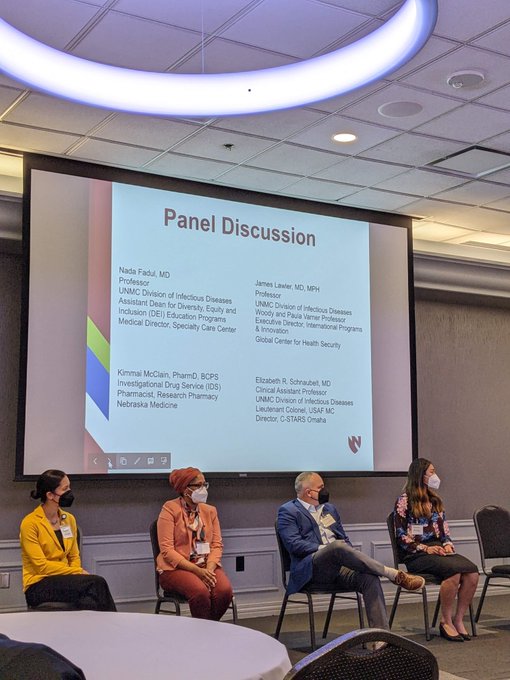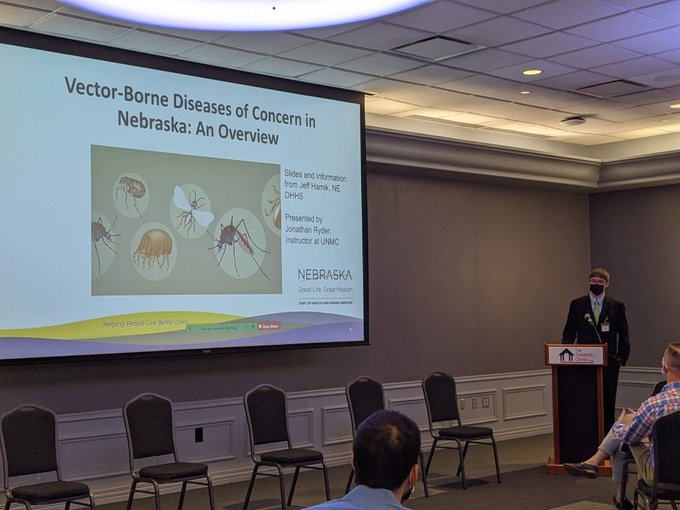
In early September, the Nebraska Infectious Disease Society (NIDS) held its first meeting. Read on below for a fantastic recap of this meeting provided by UNMC ID’s Dr. Clayton Mowrer.
The NIDS annual inaugural meeting in the books, with a really great turnout of ID and public health providers from across the state. Here’s a brief recap of the morning:
The meeting started off with Dr. Maureen Tierney recapping our achievements in our first year, highlighting quite a bit of work that has already been done and emphasizing all that is still to be done.

Next, Dr. Angela Hewlett discussed the current multinational monkeypox outbreak. She relayed the situation update, noting some improvement seen in incidence here in NE. She also emphasized the differences in clinical presentations in this current outbreak compared with our previous understanding of the disease, reviewed the diagnosis, and noted the currently available treatment options as well as challenges to follow up. Dr. Hewlett’s discussion was followed by a panel discussion with Lt. Col. Elizabeth Schnaubelt, MD, Nada Fadul, MD, James Lawler, MD, MPH, and Kimmai McClain, PharmD. The panel took questions from the audience, generating some fascinating and important discussions regarding the processes for obtaining therapies and vaccines (improving, but still much to do on this front), the efficacy of TPOXX (which seems to speed clinical recovery and resolution of the lesions), and that there are many more opportunities to engage with our patients and make efforts to reduce stigmatization.
Daniel Cramer, APRN, FNP-c spoke on the experience UNMC’s Specialty Care Clinic has had with the implementation of and the implications following the administration long-acting ART (cabotegravir/rilpivirine). He began by reviewing the dosing, reviewed the eligibility criteria, and had a wonderful discussion of how they approach patient education about this new medication, which includes the use of patient liaisons. He wrapped up his talk with looking forward to the future and the hope of making this more available to our patients.
Arthur Chang, MD – pediatric ID faculty at CHMC – had a fantastic presentation of congenital syphilis, where he focused on a brief review with some highlighted discussion points. Important takeaways: 1) there are increasing rates nationwide, and the reasons are multifactorial; 2) the diagnosis and recognition of disease is complicated by varying testing requirements and methods within practices and among different specialties; 3) it is absolutely critical that there needs to be specific documentation about the diagnosis and treatment of the pregnant person during the pregnancy to avoid uncertainty when the baby is born.
Several individuals provided COVID-19 updates.
-David Quimby, MD, talked about the data behind some of the therapies used currently with acute COVID infections – particularly noting Paxlovid. He reviewed some of the studies behind the data: namely, EPIC-HR and the unpublished EPIC-SR, and how these data might be interpreted in real world management, suggesting that the highest benefit appears to be in our patients >60 years of age and high-risk.
-Maureen Tierney, MD, MS, presented an excellent review of what we know thus far regarding Long COVID (PASC). She notes that it is strikingly commonly reported in the US: 1 in 13 adults (7.5%) have with symptoms for more than 3 months. This syndrome seems most commonly reported in young persons, females > males, with Hispanic persons (9%) among the highest reported population. There does, however, seem to be some regional differences in prevalence.
– Alice Sato, MD, PhD, had a fantastic and thorough review on vaccinations, with a focus on the pediatric population, reminding us that kids do get sick and are hospitalized with COVID, and that long COVID can have a significant impact on the well-being of children (e.g., missing school or other activities due to their symptoms). She further highlighted some of the benefits of vaccination in children, noting the significantly reduced rate of MIS-C after vaccination, the excellent efficacy, while also highlighting the great safety profile, even in young (6 month-5 year old) persons noting that zero cases of myocarditis have been reported in this population. She wrapped up her discussion by noting the excellent efficacy of COVID vaccinations in early trials but that it is important to realize that the newer variants (BA.4/5) are the most antigenically distinct variants, thus the need for the newer bivalent boosters.

Jonathan Ryder, MD, spoke in place of Jeff Hamik (the NE state vector-borne epidemiologist, who was unable to make the talk), and he provided a fascinating review of the epidemiologic data of vector-borne illnesses in NE. He reviewed: the rise in neuroinvasive cases of West Nile Virus; the appearance of invasive Aedes mosquitos (A. aegypti, A. albopictus) in SE NE, though providing reassurance that A. aegypti eggs cannot survive the winter here and are likely single events; the establishment of Ixodes ticks in NE as of 2019, with now a couple cases of Lyme disease and the isolation of B. burgdorferi from ticks here in NE; a rise in tick vectors for SFGR, Ehrlichia, and Tularemia. Because of these data, NE DHHS has received funding for further tick surveillance and testing. Lastly, he emphasized the important role that climate change is likely playing on the spread of such vectors and the rise in incidence of these diseases.
Finally, several trainees presented some fun cases:
- Anne Lentino – a medical student with Creighton School of Medicine – presented a case of a child with Bartonella henselae infection, initially presenting as FUO.
- Annie Nguyen – another medical student at Creighton – presented an impressive study reviewing the incidence of fungal infections in patients hospitalized with acute SARS-CoV-2 infection.
- Stephen Cooper, MD, MPH – an internal medicine resident at Creighton School of Medicine – presented a really great QI study on improved awareness and usage of local antibiograms among resident trainees, providing excellent implementation protocol and follow up. The results were promising.
- Mackenzie Keintz, MD – an infectious diseases fellow at UNMC – presented her research asking the question if or when it is appropriate for transition to PO antibiotics in uncomplicated beta-hemolytic streptococcal bloodstream infection. Early data suggests PO transition can reduce length of stay in stable patients.
And with that, our successful first meeting was brought to a close!
(Note: Photos of this meeting were taken from ID Nebraska’s Twitter page. Check them out here: @IdNebraska)